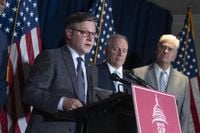In the wake of the assassination of conservative activist Charlie Kirk, a seismic shift has rattled the American political landscape, particularly within the Republican Party. According to a new nationwide poll by the Associated Press-NORC Center for Public Affairs Research, pessimism about the country’s direction has surged to record highs, with a majority of Republicans now expressing deep concern about the nation’s trajectory. The poll, conducted from September 11 to 15, 2025, surveyed 1,183 adults and carries a margin of error of ±3.8 percentage points. Its findings paint a portrait of a nation not only divided along partisan lines, but also shaken by the specter of political violence and economic anxiety.
Since June, the share of adults who say the country is on the wrong track jumped 13 percentage points, from 62% to 75%. This dramatic rise is driven largely by Republicans, whose own sense of optimism has collapsed since the summer. In June, only 29% of Republicans said the country was heading in the wrong direction; that number has now soared to 51%, according to AP-NORC. The trend is even more pronounced among younger Republicans and women: 61% of Republicans under 45 now say the country is off track, compared to 43% of their older counterparts, and Republican women (60%) are more likely than men (43%) to share this view.
The catalyst for this sharp turn in sentiment is unmistakable. On September 10, 2025, Charlie Kirk—the 31-year-old founder of Turning Point USA and a prominent figure among young conservatives—was assassinated during a public appearance at Utah Valley University. The killing, widely attributed to political motives, has sent shockwaves through the Republican base and ignited a broader conversation about the state of American civil society. As reported by Newsweek, Kirk’s death “ignited conservative anger about political violence coming from the left, and a broader conversation about the health of American civil society, including the line at which free speech crosses into incitement to violence.”
Republican voters are now demanding tougher action against far-left groups and what they perceive as violent rhetoric. President Donald Trump, who is currently serving his second term, has promised to designate Antifa as a terrorist organization in response to Kirk’s assassination. Attorney General Pam Bondi has vowed to crack down on “hate speech.” However, civil liberties groups are raising alarms about potential overreach, warning that aggressive policing of speech could threaten First Amendment rights. The recent suspension of comedian Jimmy Kimmel’s ABC talk show, following controversial remarks, has only intensified the debate over free speech and censorship.
The sense of unease is not limited to the Republican base. The AP-NORC poll found that only 25% of all U.S. adults now think the country is headed in the right direction, down from 40% in June. Dissatisfaction with national leaders runs deep across the political spectrum: 54% of adults hold an unfavorable view of Trump (with 44% describing their opinion as very unfavorable), and similar shares express negative views of both the Democratic (53%) and Republican (51%) parties. Vice President J.D. Vance fares only slightly better, with 46% viewing him unfavorably and 21% saying they don’t know enough about him to form an opinion.
Trump’s approval ratings on specific issues remain highly partisan. According to the AP-NORC Center, his strongest numbers are on border security (55% approval) and crime (46%). About four in ten approve of his handling of health care, trade, the economy, the Israeli-Palestinian conflict, foreign policy, and immigration. Yet, overall, just 39% of adults approve of Trump’s job performance, while 60% disapprove.
Economic anxiety is a persistent theme among respondents. Inflation remains high, job instability is widespread, and prices for everyday goods continue to rise. Mustafa Robinson, a 42-year-old truck driver and father of three from Pennsylvania, told the Associated Press, “It’s like, you think you’re heading in the right direction with your career and your job, but everything around you is going up in price. It seems like you can’t catch a break. But we are also supposed to be united as a country and coming together. And we are not. I’m so perplexed how we’re not on the same page about anything, so bad that these people are being shot.”
The poll also reflects deep concern about social cohesion and the rise of political violence. Recent months have seen a string of high-profile attacks: the assassination of Democratic state lawmaker Melissa Hortman and her husband in Minnesota, a suspected arson attack on Pennsylvania Governor Josh Shapiro’s mansion, and even an assassination attempt on President Trump himself. Chris Bahr, a 42-year-old Republican from suburban Houston, described his growing anxiety: “I’ve spent a lot of time worrying about the worsening political discourse and, now, the disturbing assassinations.”
In response to these threats, Trump has taken extraordinary measures, including taking control of the local police department and deploying the National Guard and federal law enforcement to Washington, D.C., in August 2025. While crime remains a relatively positive issue for Trump, the public is divided on the use of military force in domestic affairs. Half of adults say it is acceptable to use the U.S. military and National Guard to assist local police departments, but 61% consider it unacceptable for the president to take direct control of local police. Republicans are evenly split on the issue, while majorities of Democrats and independents oppose it.
There is also widespread unease about Trump’s use of presidential power. Approximately 60% of the public feels he has gone too far in imposing new tariffs, wielding executive authority, and deploying military or federal law enforcement in U.S. cities. Nearly all Democrats believe Trump is overstepping, but even among Republicans, about a quarter to a third say some of his actions have gone too far.
With the 2026 midterm elections on the horizon, these findings suggest potential trouble for the GOP. The spike in pessimism among its base—driven by political violence, economic hardship, and a sense of national division—could foreshadow a backlash at the ballot box. As one Republican voter put it, “We’re not on the same page anymore. It’s like a social collapse. Kirk’s killing might be the spark that sets off a firestorm.”
The AP-NORC poll, drawing from a probability-based panel designed to reflect the U.S. population, underscores the complexity of America’s current predicament. Rising pessimism, fraying trust in institutions, and the specter of violence have left many Americans—regardless of party—questioning the nation’s path forward. As political leaders debate how to respond, the country remains on edge, awaiting the next chapter in an increasingly turbulent era.


